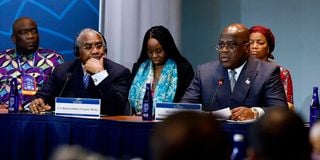What continent is hoping to reap from US-Africa leaders summit

Democratic Republic of the Congo President Felix Tshisekedi speaks during the Conservation, Climate Adaptation, and Just Energy Transition Forum during the US-Africa Leaders Summit at the Walter E. Washington Convention Center in Washington, DC on December 13, 2022.
On the eve of the much-awaited high-level meetings of African leaders, convened by President Joe Biden, the US Trade and Development Agency (USTDA) held a breakfast event bringing together key financial institutions that are supporting infrastructure projects across Africa.
The interactive meeting was facilitated by Enoh T. Ebong, Director at USTDA, with Wally Adeyemo, the Deputy Secretary of the Treasury, delivering welcome remarks. The US government was also represented by Reta Jo Lewis, President and Chair of the Board of Directors of the Export-Import Bank of the United States.
For three decades now, USTDA helps companies create US jobs through the export of US goods and services for priority infrastructure projects in emerging economies, including in Africa.
The agency links American businesses to export opportunities by funding project preparation and partnership-building activities that develop sustainable infrastructure and foster economic growth in partner countries.
Its current portfolio in Africa has more than 80 ongoing activities across 26 countries with a reported combined potential to unlock more than $15 billion in public and private financing and boost American exports by more than $7 billion.
African financial institutions present included the United Bank for Africa Group ably represented by the Group Chairman Tony Elumelu, and Sola Yomi-Ajayi, the Group Executive Director for Treasury & International Banking& CEO for UBA America, and Eric Jones Odhiambo who is the Group Executive Corporate and Investment Bank at Ecobank Transnational Inc.
Other institutions present included: Africa Finance Corporation, Africa Investment Forum, Africa50, African Export–Import Bank, Alliance for Green Infrastructure in Africa, Development Bank of Southern Africa, Heirs Holdings Group, Infrastructure Credit Guarantee Company, Standard Bank Group, Trade and Development Bank, and Vista Group Holding.
Speakers lauded the US government for convening the summit and underscored its unique capacity to help Africa close its infrastructure gap which is estimated at more than $100 billion a year.
There were other nuanced messages; including the need for the American government to nudge and encourage its business community to set up shop in Africa, and help this youthful continent achieve its industrialisation, job creation and sustainable development aspirations.
There were calls for partners, especially multinational development banks, to do more, and better, in meeting Africa’s needs. A call was made for the US leadership to help Africa have greater access to the Special Drawing Rights (SDRs) of the International Monetary Fund.
SDRs are a large international reserve asset that supplements the official reserves of the Fund and represent a large pool of resources that could be availed to Africa to accelerate its infrastructure projects.
Speakers called for greater collaboration between different actors, stressing that working together, and pooling resources helps mitigate risk, eliminates duplication and waste, and is a means for harnessing synergy from the hard-to-find skills.
A call was made to the US government to consider increasing its funding for project preparation and development, noting that these activities hardly receive budgetary allocations from governments.
The prioritisation of regional infrastructure can help further deepen the ongoing integration efforts, boost intra-Africa trade, and enable the Africa Free Trade Continental Area to truly thrive.
Dr Elumelu pointed out that whereas it is true that Africa needs an inflow of capital and technology, it’s up to its leadership to create an environment that is attractive to foreign investment, stressing that without it, the continent will continue lagging behind other regions.
In her remarks, Director Ebong stated that USTDA was one of the leading infrastructure project preparation facilities operating in Africa and that it has considerable experience, expertise, and unique partnerships with Africa’s public and private sectors and financial institutions that have been cultivated over a period of thirty years.
While no deals were signed at this event, there is great optimism that the US government may announce a support package that could help promote Africa’s infrastructure projects, as well as deal with climate change impact.
One of the highly anticipated sessions will take place on Wednesday morning when President Ruto will speak on a panel discussion under the theme “Charting the Course: The Future of US-Africa Trade & Investment Relations”. This is just the second time that the US is convening a high-level meeting with African heads of state and government.
Mr Chesoli is a New York-based development economist and global policy expert





